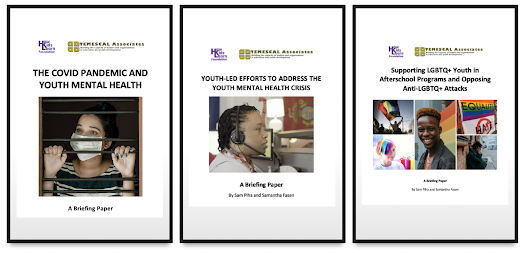 |
| Soren Kaplan |
By Sam Piha
Many people, young and old, ask themselves, “Am I smart?, Am I intelligent?” Traditionally this was measured by an IQ test or for many young people, their grades received in school. The notion of intelligence changed in the 80’s and 90’s, with the idea of “multiple intelligences.” In his new book, Soren Kaplan promotes the idea of “Experiential Intelligence,” or XQ.
“Rather than book smarts or empathetic abilities, experiential intelligence is a measure of how your life experiences have shaped the way you think, what you know and how you use that knowledge.” - Natasha Piñon, A more useful way to measure intelligence, XQ is ‘the new EQ,’ says USC researcher
While Kaplan's idea of experiential intelligence has been adopted by leading business thinkers, we thought that the idea of experiential intelligence was important for youth workers to understand. This is because everyone, regardless of race, gender or social economic status has life experiences that can add to experiential intelligence. We interviewed Dr. Kaplan to learn more about this idea. Below are his responses.
“When you more fully understand the impact of your past on how you think, feel, and act, you increase self-awareness. And by exploring your most challenging experiences with greater intention, you can discover hidden strengths that you can use to empower your future.”- Soren Kaplan, Your Childhood Traumas Can Empower Your Future Success
Q: People often say they are "smart." What is the difference between "smart" and "intelligence"?
A: Sometimes we use the word smart to describe someone’s ability to function effectively in the world. Think about the term “street smarts” for example. This term suggests someone might not have a high score on an IQ test or have received the highest test scores in school, or even a degree, but rather the person is adept at navigating the world because of their experiences. Intelligence, on the other hand, is typically tied to more formal definitions related to the intellect and IQ tests.
Q: Can you define experiential intelligence?
A: Experiential Intelligence, or XQ for short, is "the combination of mindsets, abilities, and know-how gained from your experiences." Just as memorizing facts doesn't give you a high IQ, Experiential Intelligence isn't merely what you've learned over time. It's how you view opportunities, perceive challenges, and tackle goals.
Your XQ consists of:
- Mindsets: attitudes and beliefs about yourself, other people, and the world
- Abilities: competencies that help you integrate knowledge, skills and experiences to respond to situations in the most effective way possible
- Know-how: your knowledge and skills
As a complement to IQ and EQ, Experiential Intelligence expands our understanding of what's needed for success in today's increasingly uncertain, ever-changing business environment. XQ is like the third leg of a stool that's been propping us up all along but that we haven't been able to see because it's been hidden beneath our seats.
Here are a couple of articles that were written about my book that define this a bit deeper:
- A more useful way to measure intelligence, XQ is ‘the new EQ,’ says USC researcher
- Your Childhood Traumas Can Empower Your Future Success
Q: Can experiential intelligence come from negative experiences?
A: Research from Richard Tedeschi on Post-Traumatic Growth reveals how “negative experiences can spur positive change, including the recognition of personal strengths, the exploration of new possibilities, improved relationships, a greater appreciation for life, and spiritual growth.” People who have endured natural disasters, bereavement, job loss, economic stress, and serious illnesses often gain insight into themselves and the world in ways that transform their lives. The opportunity is to understand how your past led to tangible strengths, not despite your traumatic experiences, but because of them.
Q: It occurs to me that "experiential intelligence" is very democratic and can be possessed regardless of socio-economic status. Your thoughts?
A: It absolutely is. Everyone has street smarts because we all have experiences. And our experiences give us strengths and assets. So, it’s as democratic as can be.
Q: How can someone discover his/her hidden strengths that have come from past experiences?
A: There are two strategies for viewing your past:
- Gain insight into how the negative impacts of certain experiences may still linger with you today so you can overcome them
- Uncover hidden strengths that certain experiences delivered to you that can be leveraged in new, creative ways.
Q: Similar to "growth mindset," it seems the notion of experiential intelligence is very useful in working with youth as it credits their experience regardless of socio-economic status. Your thoughts?
A: Again, I completely agree. When working with youth in schools, in the home as parents, as educators, etc., we have the opportunity to:
- Recognize the strengths that exist because of all experiences.
- Help youth see their experiences holistically, as things that might have been difficult that might need to be addressed due to certain struggles but at the same time instilling unique strengths. Allowing youth to understand themselves better and see their strengths not despite their experiences but because of them.
- Create experiences that build intelligence – dialoguing with others they might not normally experience (elderly, from other schools, ages, etc.), travel to unusual places in nature or cities, new types of games and experiential learning activities, etc.
There are several video interviews/ podcasts with Soren Kaplan that are available to watch online at no cost. Below is one video that is worthy of your attention:
Inside Personal Growth, Podcast 993: Experiential Intelligence with Soren Kaplan
MORE ABOUT...
Soren Kaplan is the bestselling and award winning author of Leapfrogging, The Invisible Advantage and his newest release, Experiential Intelligence: Harness the Power of Experience for Personal and Business Breakthroughs. He is also an Affiliated Practitioner at the Center for Effective Organizations at USC’s Marshall School of Business, a writer for FastCompany and Inc. Magazine, a globally recognized keynote speaker, and the Founder of InnovationPoint and upBOARD. He has been recognized by the Thinkers50 as one of the world’s top thought leaders in business strategy and innovation.
He has been quoted, published, and interviewed by Harvard Business Review, Fast Company, Forbes, CNBC, National Public Radio, the American Management Association, USA Today, Strategy & Leadership, and The International Handbook on Innovation, among many others.



















